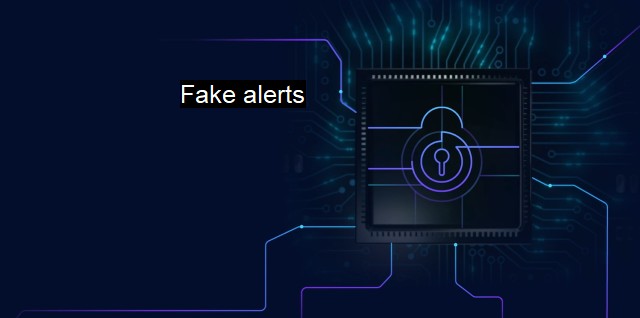What are Fake alerts?
Spotting and Avoiding the Threat of Fake Alerts: A Vital Guide to Cybersecurity and Antivirus Protection
Fake alerts, or fake security alerts, are a type of cyber threat designed to deceive or mislead users into believing that their computer has been infected by a virus or malware. Typically, these alerts inform users about a supposed critical threat that needs immediate attention and ultimately persuade users to download harmful software or disclose sensitive personal information, including financial information. The primary objective of cybercriminals behind these deceptive alerts is to cause fear and panic that prompt hasty decisions leading to serious repercussions, including identity theft and financial loss.In the context of cybersecurity and antivirus software, fake alerts can appear quite credible. These pseudo warnings are a primary deception technique employed by malicious actors with advanced programming prowess intending to infiltrate, damage, disrupt, or gain unauthorized access to computer systems, often for profit-oriented motives. Fake alerts typically manifest as pop-ups on web pages or computer screens possessing attention-grabbing messages such as "Your computer has been infected! Download Antivirus X now to protect your computer". Many fake alerts also resemble legitimate messages from established security vendors, mimicking their formatting, logo, and language to generate perceived authenticity.
The precise incarnation of a fake alert can vary extensively; some claiming your software is outdated and requires upgrading, others insisting that you have won a prize that can only be claimed by sharing personal information, often accompanied by high-pressure tactics to coerce quick decision-making. Increasingly, these alerts are distributed through emails disguised as notifications from well-known corporations, social engineering scams, or even malware specifically designed to generate such messages automatically.
A notable aspect of these fake alerts is how they peddle rogue security software or "ransomware". This refers to potential security solutions that appear legitimate but are, in reality, designed to damage or cripple systems they ostensibly protect. Once a victim responds to an alert and downloads the suggested software, dramatic scans commence, post which a considerable amount of threats is discovered - another deceptive ploy. At this stage, victims are asked to purchase a full-version of the antivirus software that paradoxically does not provide any protective shield but instead infuses the system with more malware or spyware.
In worst cases, these rogue security software might lay dormant, persistently surveilling user activities and relaying sensitive information to malicious actors without raising user suspicion. Users might also inadvertently provide cyber-criminals with their payment details under the hoax of purchasing premium protection features, potentially leading to financial theft.
Combatting fake alerts critically depends on user awareness and vigilant cyber hygiene. A sudden alarm regarding the system's security status is the first hint of a deceptive security alert. Users are urged to not click on any links or download files from these alerts; merely closing such communications should suffice. If suspicions persist, directly visit the official website of your security vendor to check for official updates or alerts. users should keep their operating system and applications updated, maintain an active legitimate antivirus software, regularly backup data, and use robust, unique, and hard-to-guess passwords across applications to add additional layers of security.
Fake alerts represent an increasingly potent threat in the cybersecurity space, orchestrated by malicious actors to deceive users and detract from stable digital operations. As reliance on digital infrastructure continues to grow, awareness around such tactics has become equally important. Despite their sophistication, countering them is often simple - a blend of user literacy, healthy skepticism, and robust security practices align to form the first and perhaps the most powerful line of defense.

Fake alerts FAQs
What are fake alerts in cybersecurity?
Fake alerts in cybersecurity are pop-up messages or notifications that appear on your computer or mobile device warning about a particular issue, such as a virus or malware infection. However, these alerts are often fake and designed to trick you into taking action that can harm your device or compromise your personal information.How do fake alerts work?
Fake alerts often use scare tactics to make you believe that your device is infected with a virus or malware. They may also mimic the look and feel of legitimate antivirus software to create a sense of urgency. Once you click on the alert or download any software, you may unknowingly download malware onto your device or give hackers access to your personal information.How can I protect myself from fake alerts?
To protect yourself from fake alerts, it's important to always use reputable antivirus software and keep it up-to-date. Be cautious when clicking on pop-ups or notifications, especially if they seem suspicious or offer too-good-to-be-true deals. Also, avoid downloading software or apps from unknown sources or clicking on links in unsolicited emails.What should I do if I encounter a fake alert?
If you encounter a fake alert, do not click on it or provide any personal information. Instead, close the window or notification and run a full scan with your antivirus software. If you believe that your device has been compromised, contact your IT department or a reputable cybersecurity professional for assistance.| | A | | | B | | | C | | | D | | | E | | | F | | | G | | | H | | | I | | | J | | | K | | | L | | | M | |
| | N | | | O | | | P | | | Q | | | R | | | S | | | T | | | U | | | V | | | W | | | X | | | Y | | | Z | |
| | 1 | | | 2 | | | 3 | | | 4 | | | 7 | | | 8 | | |||||||